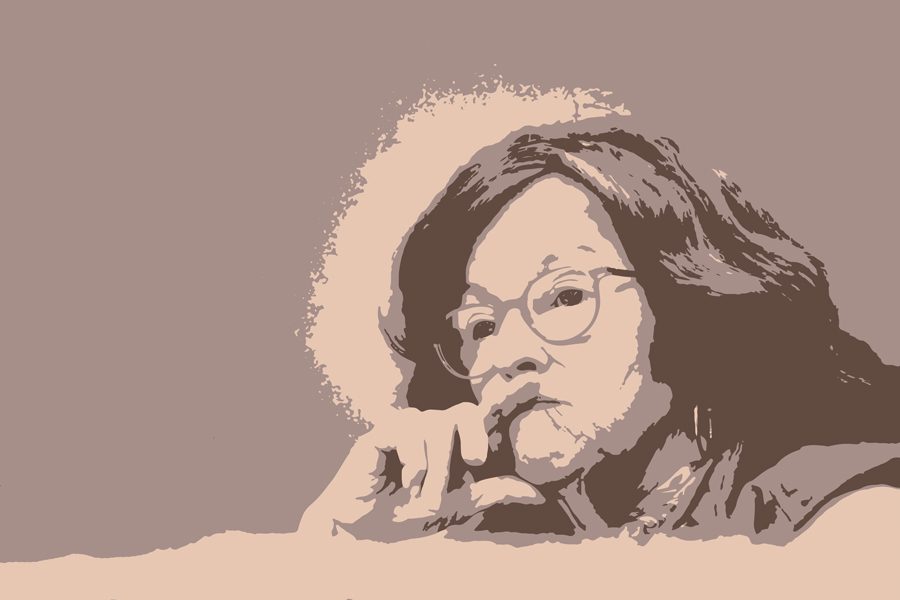Ethics Board to draft memo on possible City Code amendment
Photo illustration by Kristina Karisch, file photo by Colin Boyle
A photo illustration of Ald. Ann Rainey (8th). Rainey was found in violation of the Evanston Code of Ethics in late 2018, and some board members voiced concerns that ethics investigations such as Rainey’s prompted a change in the process of amending the City Code.
May 22, 2019
Evanston’s Board of Ethics will draft a memo on an ordinance that would amend the City Code following ethics complaints directed toward aldermen.
The board discussed the ordinance draft at its Tuesday meeting. The ordinance would amend the “City of Evanston Code of Ethics and Board of Ethics” portion of the City Code. A subcommittee of the Rules Committee was created to draft the ordinance, and during the meeting, the board echoed sentiments that the revisions were “rushed” and lacked transparency.
Board members voiced concerns that this process gives the impression that the city requested the amendments through the Rules Committee instead of the Board of Ethics. The original requests were made after aldermen became repeated subjects of ethics complaints, including Ald. Robin Rue Simmons (5th) and Ald. Ann Rainey (8th). While Rue Simmons did not violate the Code of Ethics, Rainey was found in violation on three counts. During Rainey’s proceedings, she was able to vote to place her own memorandum on file, which prevented any further action. Following the vote, aldermen called for a reexamination of the code.
Board member Karena Bierman asked why the request to rewrite the code wasn’t made to the Board of Ethics. She recommended asking the subcommittee to “think long and hard” about bypassing the Board of Ethics and whether this action truly furthered the interests of the community.
“It seemed quite reactionary,” board member Elizabeth Gustafson said.
The members decided that the draft included a lack of “internal controls” and checks on different city officials and boards.
One particular issue the board raised was establishing a hearing officer whose role would include listening to testimonies about possible code violations, issuing final orders and imposing penalties.
“There were some curious adjustments that I felt like other boards were not subjected to … and an element of subjectivity in the selection process of certain key positions, such as hearing officer,” board member L.J. Ellul said.
The board worried that the powers ascribed to this role would render the Board of Ethics useless. Bierman said the establishment of a hearing officer would take away key powers from the chair of the Board of Ethics and the board as a whole.
Bierman read a comment from board chair Jennifer Billingsley, who could not attend the meeting.
“If the hearing officer issues the final order on penalties, then there’s no need for a Board of Ethics or an advisory opinion — the hearing officer’s carrying out all of the functions of the board, so there is no need for both,” the statement said.
Billingsley’s comments also mentioned that if the hearing officer is just presiding while the Board of Ethics issues an opinion to City Council, who in turn imposes any penalties, then the final two duties of the hearing officer outlined in the draft are unnecessary.
Another recurring issue the board found was inconsistency with terminology throughout the draft. Bierman said that definitions of certain terms found at the beginning of the draft weren’t consistently used throughout the document.
For example, board members raised concern over the use of the term “covered persons,” defined in the draft as “every elected official, appointed official or employee of the City,” unless otherwise specified. Bierman was mainly concerned with who would be counted as a covered person: She mentioned spouses, significant others or people seeking to do business with the city. She said they are not mentioned in the current draft and therefore appear not to be covered by the code.
As a result, further uses of “covered persons” later in the ordinance to mean everyone Bierman mentioned can render confusion.
The Board of Ethics plans to draft a memo for the subcommittee of the Rules Committee outlining its thoughts and recommendations on the ordinance draft.
Email: [email protected]
Twitter: @emmaeedmund


